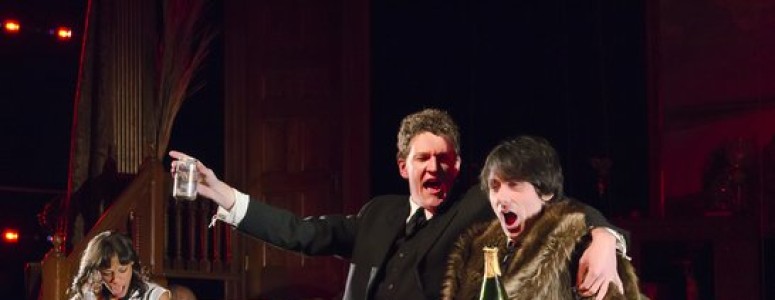The program lists 25 musical selections, which is a greater number than are found in Assassins and Hello, Dolly! – combined.
But Preludes is hardly a musical, for those selections are mostly snippets. Beethoven and Mussorgsky are heard for merely a few measures.
However, eleven selections come from esteemed Russian composer Sergei Rachmaninoff (1873-1943) and twelve have music and lyrics by Dave Malloy. The latter is the author of Preludes, the play with music that’s currently at the Claire Tow Theater at Lincoln Center.
Needless to say, because Rachmaninoff died in 1943 and Malloy wasn’t born until 1976, the two artists didn’t collaborate. Malloy took the liberty of selecting in incident in Rachmaninoff’s life and interspersing such pieces as Prelude in Bb major and Prelude in G# minor. Those keys turns out to be metaphorical, because some of Malloy’s scenes are sharp and some fall flat.
Most playwrights leave the songwriting to others, but Malloy has both credentials and a pedigree thanks to his wondrous work with the 2013 virtual opera Natasha, Pierre & The Great Comet of 1812. (That was a musical version of War and Peace; we can all be pardoned for wondering if Malloy was a Russian in a previous life.)
Once again, Malloy is working with director Rachel Chavkin who also gets a “developed with” credit. So she must take a bit of the responsibility for delivering a work that is intermittently tedious.
Too bad, for Preludes looks promising at the start when the house lights don’t dim but snap off to take us by surprise and leave us in complete darkness. Not since Carrie in 1988 has a show dared to do that.
Then comes a patience-testing pause that’s longer than one found in any ‘60s Pinter play. But to be fair, sometimes there is dead silence when a depressed patient is with his psychiatrist.
No – not psychiatrist; but hypnotherapist. Malloy tells of Rachmaninoff’s inability to write for three solid years. His wife made the radical suggestion that he try this new-fangled method that just might cure what ailed him.
In reality, Rachmaninoff went to Nikolai Dahl (1860-1939), but here the character is simply known as Dahl – for Malloy has engineered a sex-switch and made the hypnotherapist a woman. Historical accuracy be damned; Eisa Davis is superb in the role, self-assured in her character’s profession while never being either condescending or arrogant. Here’s wishing the accomplished actress a long career, but if things don’t work out on stage or screen, Davis gives every indication that she could be a most helpful therapist.
With all that music to play, Malloy obviously knew that finding a fine actor who was also a Rachmaninoff-level pianist would be an onion-dome-high tall order. So he instead wrote the play for one actor (Gabriel Ebert) to portray “Rach,” the name he’s given the actual Rachmaninoff, and put another performer (Or Matias) at the piano. That’s the character that he calls Rachmaninoff. That choice was both confusing and unnecessary.
Dahl’s innocent question “How was your day?” yields much more from Rach than she bargained for. Malloy is letting us know early on that this will be quite the loquacious evening. The problem is that what Malloy finally divulges at the end of the hypnotherapy sessions is logical but not much of a surprise. What bothered Rachmaninoff and ultimately cured him could have been said in no time flat without requiring 130 minutes.
Malloy doesn’t stop at gender-bending, but dabbles in time-travel too. How else to explain Rach’s referring to Gordon Lightfoot or the selection we hear from Bill Withers’ “Lean on Me”? Is this Malloy’s way of suggesting that Rachmaninoff’s music transcends time?
After jolting us into the future, Dahl reminds us where in history we are when she cautions “You must ask the Tsar’s permission to marry.” His Majesty comes in, courtesy of Chris Sarandon, who also must double as Chekhov, triple as Tolstoy and quadruple as Tchaikovsky.
They all seem to be images coming out of Rach’s head, for Tchaikovsky even bluntly asks him “Do you really think that you and I are talking right now?” Rach at least tries to converse with Chekhov, saying that he can relate “to his lonely, maudlin and depressed characters.” Chekhov rebuts “You don’t have it so bad” and we find ourselves nodding in agreement – especially when we finally learn what’s been keeping Rach from creating more work.
Pianist Matias needs to press the soft pedal much more, for he often drowns out dialogue. Nikki M. James as Rach’s fiancée and Joseph Keckler as noted 19th century opera star Feodor Chaliapin don’t have much to do, but they do it well.
Ebert has a comic’s face that’s a little lightweight for the tortured soul that Rach is supposed to be. He does do justice to the line Malloy gives him when a famous composer criticizes his work. The way he growls, “He’s an old man!” reminds us that citing a critic’s advancing years as evidence of his incompetence is the easiest way to deflect and ignore criticism.
Yet Ebert makes Rach on-target aware when he refers to one of his early compositions and asks “What if this is the best I ever do?” There is a good chance that at the end of Dave Malloy’s career, Preludes will not be judged as his best play. Nevertheless, it’s precisely the type of work that should be at The Claire Tow Theater – Lincoln Center’s new playhouse designed as a place where young playwrights can experiment and learn from experience, be it beatific or bitter.
One group, however, is going to be thrilled with Preludes: hypnotherapists, for the play stresses how they can work wonders with their patients. The rest of us may spend a fair amount of time yawning.




